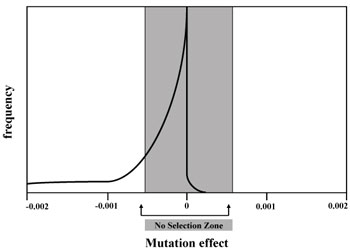 This is one of the particularly poignant hurdles against the subject of this prideful man-made imagination of the naturalistic evolution of all things from pond-goo or inorganic molecules.
This is one of the particularly poignant hurdles against the subject of this prideful man-made imagination of the naturalistic evolution of all things from pond-goo or inorganic molecules.Heed the graph to the right. On the horizontal axis we have the probability of a positive or negative effect of a mutation to be selected for by natural means. On the vertical axis we have the relative frequencies of these (im)probable mutations. Now, first it must be said that this graph almost certainly wholly underestimates the unlikelihood of an environmental factor to meaningfully select for or against a mutation.
The problems are numerous, first a mutation has to actually correspond to some kind of meaningful phenotype (which is unlikely in the extreme), and then also the environmental factors have to be so fine-tuned as to select specifically for this awesomely minor phenotype difference, and ignore all the other more acute phenotypes which crowd it and vy for its attention. Secondly the environmental factor has to also somehow ignore all the other uninherited factors which constitute the largest part of the realised phenotype, and somehow distinguish between a phenotype ever so slightly (if at all) influenced by an ever so slight mutation, and the full range of phenotypes brought about by the synergism of inherited factors and uniherited factors (there most likely will not be any way to distinguish). For example, it is thought that 99.6% of fitness is not related to inherited factors at all.
But even setting all these insurmountable problems aside (for the sake of our foolish and deceived atheistic naturalists, knowing that is only by the free sovereign grace of God that we ourselves are not so deceived), this graph gives us a gray region in which it is considered that the effect of the mutation is so near neutral, that it is considered to not have any effect at all. First notice that most mutations fall into this bracket, second notice that almost all mutations are deleterious, third notice that some deleterious mutations do emerge on the left, but fourth notice that the positive mutations (which in fact cannot increase information or create new functions anyway) do not come close to escaping the gray band. What does all this tell us (at the very least)?
- No mutation can provide new information or new functions, only "fine-tune" (or hugely more likely mess-up) what is already there.
- Positive mutations are thoroughly out-weighed by deleterious ones.
- Almost all mutations have little or no effect on actual phenotypes (and positive ones even much less so).
- Any effect on actual phenotypes is wholly crowded out by all the other factors which influence phenotypes, most not even heritable.
- Even if the right environmental factor was present to select for this phenotype it would have next to no correspondence to the mutation.
- The environmental factor that would select for a particular phenotype would mostly be entirely crowded out by all the other environmental factors involved.
- Natural selection is totally blind and mostly does not select for the best phenotypes, but rather the selection is mostly determined by chance in a natural environment because the difference in phenotypes is usually insignificant anyway.
All this is without even mentioning the vast plethora of other insurmountable hurdles, such as every single step from inorganic chemicals to organic chemicals, organic chemicals to useful biological molecules, useful biological molecules to useful cell components, useful cell components to cells, cells to specialised cells, specialised cells to tissues, tissues to organs, organs to systems, simple systems to complex systems, and the list goes on and on. And in between each of these is hundred more impossibilities or more. Added to this is the innumerable irreducible complexities within even the smallest components of every single living organism on the planet, living systems, cells, molecules, etc.
No, not in a million years would even one of these hurdles be overcome (and most not even by carefully-guided and designed processes). Not in a billion. Its time evolutionists faced up to harsh realities of physics, chemistry and mathematics. And then take a look at the fossil record too - distinct species, not intermediates are found. And then turn around and look at everything sensible biology and genetics has discovered to date and see that it has flown in the face of this fantasy of evolution.
Everything in the true science of biology teaches us about the awesome wonder of creation and the glory of the incomprehensible transcendent Creator. But all we ever learn here can only ever condemn us for our sinfulness in not giving the praise that our Creator deserves. The Gospel of Jesus Christ alone is what tells us of how we may be redeemed from our sins and the punishment we deserve.
- Sam W.
Thanks to CMI for this article: http://creationontheweb.com/content/view/6102
For a full list of references see the above article.
Any questions or objections can be addressed to CMI but have probably already been answered or refuted by them.
See a previous post for more on why this issue is important for me and for all Bible-believing Christians.
No comments:
Post a Comment